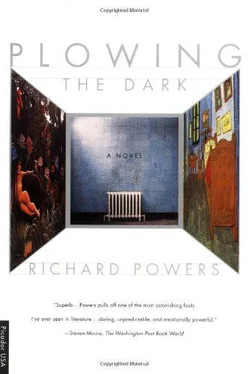You flip between following out this tale and fleeing from it. Ali's small sadisms — saying you will be released tomorrow; charging into the room at random intervals to catch you without blindfold; tossing a gorgeous orange just out of your reach — are nothing compared with recollection. You can deal with Ali, ignore his feeble invitations to believe. But against the torture of expectation, you have no defense.
Events seem blessedly bent on distracting you. This season produces some subtle shift in the front. One of the host of autonomous nations— the Druze, the Maronites, the Phalangists; the nomadic dreamers, daily harder to keep straight — some law unto itself is making a play to extend its jurisdiction. The tactics play out behind the gray screen of corrugated metal stapled across your window's gouged-out eye.
But you don't need to see these hidden developments to map their tactics. For days, rifled artillery lob their lazy cargoes in. You hear the distant puff of firing, count the intervening quarter-seconds, and feel the annihilating crush when it slams back to earth. Your brain does the ungodly calculus, the complex trig that locates in space the arc of each explosion. You mark the ebb and flow, the advance and retreat in your shaking abdomen, telling from the sound of impact the difference between a suq taken out, a playground, a parking lot, or the sheered face of an apartment high-rise.
Sayid spells out just who is on the move. Afwaj al Muqawamah al Lubnanya. The Lebanese Resistance Battalions, whose name forms the acronym Amal, the Arabic word for hope.
Hope is not the innocent you once mistook it for. It does not circulate. Yours cannot mean what another takes it to be. Even between you and the woman you loved, you failed to hold the thing in common. You went into the relationship generous and likable and easygoing, and came out shaken, the person she most feared, a pathological controller and manipulator. You could not speak to her without spinning out whole chapters of dialogue in your head — countering, wheedling, needing to destroy her belief that you were desperately needy.
In another life, on another infinite afternoon, when the shells abate enough to let you disappear again down the immaculate rabbit hole, she tells you. To your standing question, she answers simply, The French Lieutenant's Woman.
She looks up, vulnerable, appraising your reaction, a little frightened, a little shining. Relieved that you know it, glad for the pleasure she has afforded you, she asks back, How about yours? The easy reciprocity that you once thought could underscore all exchanges between people who cared for each other.
And you tell her all about Great Expectations. A simple, trusting swap of hostages. Surrender everything. We cannot hurt each other as much as life will. You tell her the whole sustaining story, from graveyard to cradle. What larks! you tell her. What larks.
Time in its endlessness brings you to a complete recitation. It takes two full afternoons with your eyes pinched closed to come up with the name "Miss Skiffins." But you have all the afternoons in the world. World, time, and focus, and you start to perform superhuman feats of synthetic memory. Desperate feats, deranged, like the reflex acts of mothers lifting two-ton beams off their pinned infants.
You've forgotten nothing. Whole scenes surface out of air. They pageant before you, responding to memory's every blush. And when they don't, you make them up again. From scratch, as the idiom goes. Week after week, and the complete architecture condenses under your aerial view. Why, here's a church. Why, here's Miss Skiffins. Let's have a wedding.
You take it then, this month's contraband reading, the blessed banality of your old existence, all the engaging, pointless complications that she smuggles in to you under the nose of your captors, your lost Miss Skiffins, so unlike her real-life model, the one who lived in terror of being held accountable for ever having given anyone anything. How ludicrous the potboiler seems, how absurd and anemic, against the weeklong barrages that make up your day's only dispatches now.
But how banal the bigger text, the pointless serial novel of power, how static and tedious the scenes, how shopworn real life's theme, how lacking in invention and delivery and interest and basic narrative device, compared with the smallest mundanity of love, the chance at private denouement. You devise this simple test of lasting literary merit: which tale promises the best net present pleasure? Which will see you through the end of this hour?
All the Dickens that will ever return returns. Pip and his Estella go hand and hand out of their ruined place, and you are still here. Still here, after the story recedes, in the bombed-out rubble of your thoughts, a pile that you recognize only because it occupies the lot your house once did. Not even a blank, your mind. A nervous jitter. Twitching like some fourteen-year-old's desk-bound leg. You go for hours in the dark, not even knowing that you are shaking.
Someone brings you food. The stench no longer gags you, after this time. But something in this picked-over rubbish, not fit for hamsters, breaks you. You bang your chain against the radiator, no longer caring about the consequences. There are no consequences. You will die of blows or you will die of malnutrition. You lay into the pipes like a fare alarm. Someone rushes into the cell, intent on silencing you. The Angry Parent. He cracks you in the chest, knocking you back on the
mattress.
It stuns you. He's always gotten one of the others to dole out the physical abuse. You sit back up, stalling to catch your breath, until your pulse lowers enough for you to speak. "Listen." You wait, curious, to see what you mean to say. "Listen. Tell me your name."
You hear him breathing through his mouth. You've frightened him. But he says nothing.
"Come on. We've known each other for a long time. Coming up on a year, before you know it. You've had me over. I've returned the invitation. We should know each other's name, don't you think?"
Without seeing his face, you could easily take the sound he makes for a titter. Or he could be tensing to release another blow.
"What difference does it make? 'Ali.' 'Sayid.' Who on earth would believe me? You're going to kill me anyway. Who are you afraid I'm going to tell? God?"
You're ready. Ready for the one quick, merciful bullet through the temple. So of course, he denies you. You hear him shuffle a little in embarrassment.
"Muhammad. Call me Muhammad." "Muhammad," you repeat. "You are a Shiite?" He coughs up a little fart of contempt in his throat. Not even contempt. Not even worth asking why you bother to ask.
"Muhammad. I once read somewhere… that Shiites believe food to be the holy gift of Allah. A mirror of the divine sustenance. Look at this." You grope about for the cold stench, put your hand in it as you hold it up toward him. "This is not sacred. This is not food."
He takes the platter from you. Leaves without a word. Sometime later, another meal appears. More than sacred. Edible. You'd say delicious, but for fear of gilding the lily.
The dish steams, a Lebanese knockoff of something your mother's exercise in capitalism once specialized in. A bademjan, the heart of the almond, the life of the heart.
A halim bademjan, with some angelic substance floating around in the stew, electrifying, a taste once deeply familiar to you that you now strain to recognize. But the harder you chase after the ingredient, the more it recedes. You take a bite; the word floats there, on the tip of your tongue. The memory struggles to the surface and dissipates.
You put down your spoon and wait. You try another mouthful. The familiarity fades with exposure. Every repetition reduces the miracle. You must name it in the last morsel or lose it forever. Then, before you get it to your mouth, restored by the bits you have already devoured, it comes to you. Meat. Chunks of sacrificial lamb.
Читать дальше












